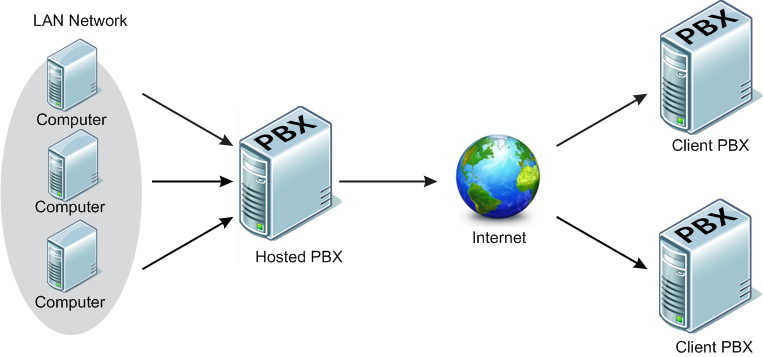Hosted PBX vs. PBX on LAN
In this page you can read about several PBX (Private Branch eXchange) types and the way they can be connected to their clients, the devices used for communication. You can get informed about how can you use a PBX to initiate simple or multimedia calls and how can the different types of networks be connected with the help of the PBXs. If you are searching for modern and high technology solutions for international communication, this page will be a great help for you.
Servers, Clients and Networks
What is a PBX? A PBX is a server that is the centre of a communication system: if you have several phoning devices or computers that you intend to use for corporate purposes, you will need a server and these devices (in this case they will be called clients) connected.
LAN stands for local area network what means that the communication devices are connected locally by a switch or router with Ethernet cables or WiFi. This network is used in places where the computers or other devices are used only to communicate indoors. (Offices, schools, homes, etc.)
The difference between a hosted PBX and a PBX on LAN is that the PBX on LAN is connected to its clients through a LAN network, so the PBX is part of the local network. The hosted PBX is connected to the clients via the Internet and the PBX is in somebody else's property (so the users do not have to create it but can have it ready for using) (Figure 1).

Advantages and Disadvantages: PBX on LAN
The advantages of PBX on LAN is that the clients can get in connection with this server even if you have no Internet connection but in this case the clients can communicate only with each other.
The disadvantage is that you must build up the whole communication system for on own:
- you must purchase a proper computer with enough free space to store the different type of data, the gateways, the wires and cables, etc.
- you must create a software that is capable to manage the data transfers, the protocols and codecs, their converting, coding and decoding, and you must solve the question of compatibility with other systems
- you must create some features in order to make your system be configurable
- you must be always ready for the error correction and any trouble that can occur
Advantages and Disadvantages: Hosted PBX
The advantages of a hosted PBX are:
- you get an advanced system absolutely ready for using
- you do not have to purchase any device (no mistakes can be made like purchasing devices that are not compatible with the other elements of the network
- you do not have to build up the physical connections of the network
- you are given a 7/24 user support
- you can configure your system according to your needs and aims
- you do not need an employee just to work on the system
The Ozeki Phone System as the host
If you need an advanced, high-technology communication system with all the advantages that a hosted PBX can provide, the Ozeki Phone System is the perfect choice for you. The Ozeki Phone System can manage all multimedia (text, audio, video) calls and conferences, can provide you a graphical user interface that is easy to use, and ensures reliable communication with anyone in the world who has a phone number or an IP address.
To get more detailed information about the topics related, please read through our pages related:
